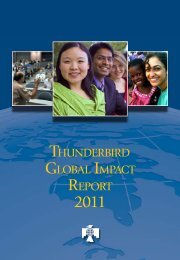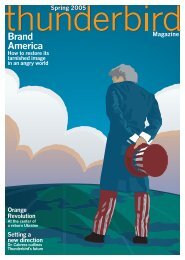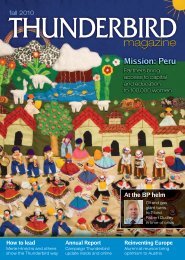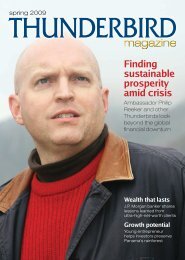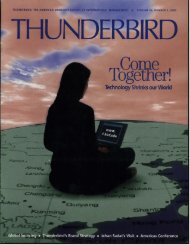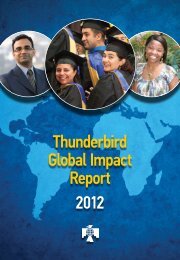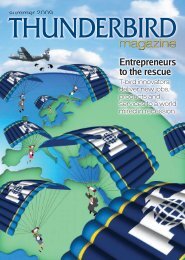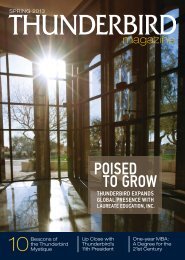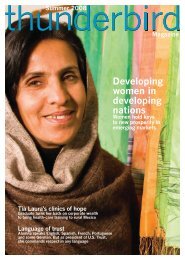Spring 11 MASTER.indd - Thunderbird Magazine
Spring 11 MASTER.indd - Thunderbird Magazine
Spring 11 MASTER.indd - Thunderbird Magazine
You also want an ePaper? Increase the reach of your titles
YUMPU automatically turns print PDFs into web optimized ePapers that Google loves.
india catches its stride<br />
to $5 million to U.S. $10 million to $20 million.<br />
“We had a balance of payments crisis in 1991<br />
where we had to quickly make some policy decisions,<br />
but that threw the doors open to foreign<br />
investment,” he says. “Now, it’s much better doing<br />
business in India. It’s much easier, freer. Except for<br />
a few sectors, enterprise can be successful.”<br />
In 2003 Jangiti launched his own venture, Asterisk<br />
Confidantes, which focuses on mergers and<br />
acquisitions, strategic advice, joint ventures and<br />
raising private capital, with a focus on midsize<br />
markets.<br />
The window of opportunity came when his employer,<br />
ING, decided to acquire a local bank and<br />
make it the company’s main platform in India. He<br />
had an attractive severance and a chance to pursue<br />
his own interests — both work and personal — so<br />
he jumped at the opportunity.<br />
“India is a country that continues to grow, and<br />
over time it will definitely be crossing the growth<br />
rates of China,” Jangiti says. “The market is here.”<br />
NEW DELHI:<br />
Riding technology wave<br />
Samarth Sangal ’08 had a coveted position<br />
as a senior management consultant at Capgemini<br />
Consulting, one of the world’s largest<br />
consulting, outsourcing and professional services<br />
companies. His work spanned the globe,<br />
with projects throughout Europe, India and the<br />
Middle East.<br />
It was also challenging: He was in charge of<br />
finding solutions for telecommunications companies<br />
trying to deal with the recession, update<br />
their technology and remain competitive.<br />
While Sangal enjoyed his position at Capgemini,<br />
he longed for the freedom of starting his<br />
own company — something he had aspired to<br />
do since childhood.<br />
“My father started his own business after<br />
working in a bank for more than 20 years,” he<br />
says. “It’s in my blood. I was on the lookout for<br />
an idea or a gap to fill.”<br />
India’s rapidly growing demand for online<br />
businesses gave Sangal his start. After realizing a<br />
gap existed between supply and demand for economical<br />
Web design and development for small<br />
and midsized businesses, he founded Maverick<br />
Web Solutions, an online services and consulting<br />
firm.<br />
Maverick allows small businesses anywhere in<br />
the world the ability to contract highly skilled<br />
website developers and designers<br />
at competitive prices. When the<br />
business became profitable, he left<br />
Capgemini.<br />
“Today, young people do not shy<br />
away from leaving a corporate job<br />
at a multinational corporation and<br />
starting something they believe<br />
in,” Sangal said. “Just a few years<br />
ago, it was difficult for someone<br />
who was settled in a corporate job<br />
to do so because of socioeconomic<br />
factors — but not anymore. Society<br />
respects your decision and encourages<br />
you to go on your own.”<br />
Realizing another need existed in India’s<br />
booming textile industry, he founded www.textilestock.in,<br />
an online platform for buying and<br />
selling textile surplus goods. Its model was inspired<br />
by Global Sources, the business-to-business<br />
trading company founded by <strong>Thunderbird</strong><br />
alumnus Merle Hinrichs<br />
’65.<br />
So far, the site has<br />
been successful in India,<br />
and within five<br />
years Sangal wants to<br />
make the brand recognized<br />
as the online<br />
trading platform for<br />
buyers and sellers of<br />
surplus goods from India.<br />
He also has several new business ideas in the<br />
works to capitalize on India’s rapid Internet<br />
growth.<br />
“Online business is still catching up in India,<br />
but the younger generation is adapting to the<br />
online business model very rapidly,” he says.<br />
“With meteoric growth in the Indian telecom<br />
sector, Internet access is no longer a luxury but<br />
a necessity, with almost all industries making an<br />
effort to interact with their customers online.”<br />
HYDERABAD:<br />
Bursting with optimism<br />
Narasimha Reddy ’<strong>11</strong> could have gone on a<br />
Winterim this year in a number of exotic locations<br />
in Africa, South America or Europe. Instead<br />
he chose a course in India that went right<br />
through his hometown of Hyderabad, one of<br />
the country’s major technology hubs.<br />
Reddy had strong motivation for being Thun-<br />
Samarth Sangal ’08<br />
“Today,<br />
young<br />
people do<br />
not shy<br />
away from<br />
leaving a<br />
corporate<br />
job and<br />
starting<br />
something<br />
they believe<br />
in.”<br />
thunderbird magazine 33



